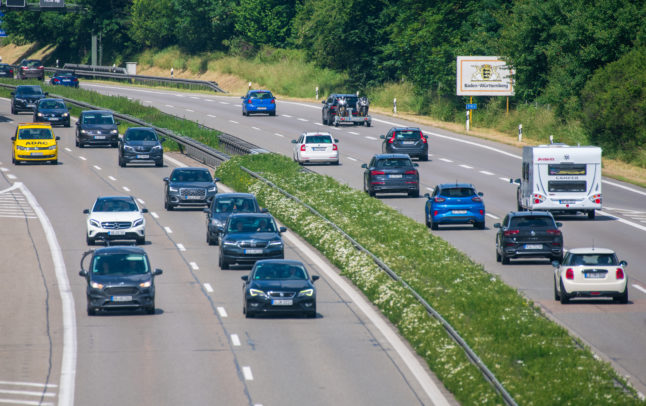Many holidaymakers are likely to be on their way back home this weekend or next weekend so key routes on the Autobahn will be crowded, said the ADAC.
The auto association expects more traffic jams than normal from Friday onwards.
In five German states, the school holidays are ending around the same time: in Lower Saxony, Bremen and Saxony-Anhalt, the last day of the school holidays is on August 16th, in Saxony it’s August 18th and in Thuringia it’s August 19th.
Adding to the mix is that the third week of holidays is about to begin in Baden-Württemberg and Bavaria.
Plus Bavaria and Saarland have a regional holiday coming up with Assumption Day – or Mariä Himmelfahrt – on Tuesday, August 15th. It’s expected that many people will use this holiday as part of a long weekend and take Monday as a ‘bridge day’ off work.
READ ALSO: When are Germany’s state and national holidays in 2023?
According to the ADAC, there will likely be traffic backed up in key areas at peak times such as Friday afternoon, Saturday and Sunday.
Particular hotspots are expected to be around the German border crossings with Austria, including the A3 between Linz and Passau, the A8 between Salzburg and Munich and the A93 between Kufstein and Rosenheim.
According to the ADAC, these stretches could get crowded:
Trunk roads to and from the North Sea and Baltic Sea
A1 Lübeck – Hamburg – Bremen
A3 Passau – Nuremberg – Frankfurt
A4 Kirchheimer Dreieck – Bad Hersfeld – Erfurt – Dresden
READ ALSO: Can I take my child out of school in Germany to go on holiday?
A5 Karlsruhe – Basel
A6 Heilbronn – Nuremberg
A7 Flensburg – Hamburg
A7 Hanover – Hamburg and Füssen/Reutte – Ulm – Würzburg
A8 Salzburg – Munich – Stuttgart – Karlsruhe
A9 Munich – Nuremberg – Halle /Leipzig
A19 Rostock – Wittstock/Dosse junction
A24 Berlin – Hamburg
A45 Giessen – Dortmund
A61 Ludwigshafen – Koblenz – Mönchengladbach
A72 Hof – Chemnitz
A81 Stuttgart – Singen
A93 Inntaldreieck – Kufstein
A95/B 2 Munich – Garmisch-Partenkirchen
A99 Munich bypass
Watch out for building sites
The ADAC also warned drivers that construction on roads could add to the build-up of traffic.
There are more than 1,450 construction sites around Germany currently.
People taking to the roads during this busy time of year are advised to try not to travel at weekends or travel early or in the evening.
According to experts, Tuesdays, Wednesdays and Thursdays are good times to travel.
The ADAC added that the holiday ban on HGVs, which is in force from 7 am to 8 pm on Saturdays until the end of August, will ease the situation.



 Please whitelist us to continue reading.
Please whitelist us to continue reading.
Member comments